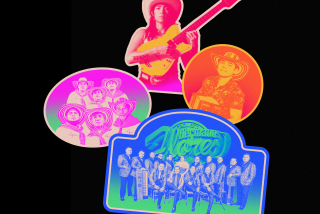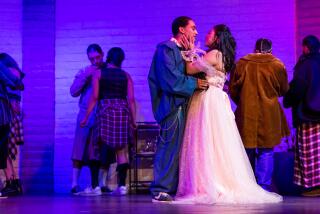Next Stop: Irvine Barclay
- Share via
Gypsy culture, for many Americans, is defined on one side by carnivals and fortunetellers, and on the others by colorful costumes, energetic dancing and wild music and by such fictional characters as Disney’s Esmerelda and Bizet’s “Carmen.”
That view has also persisted for centuries in many parts of the world, unfortunately distorting the perception of a vital subculture and--in the worst instances--subjecting a large ethnic minority to the worst kinds of cruelty. (The Nazis, according to Simon Wiesenthal, exterminated at least 2 million Gypsies during World War II.)
On Monday at the Irvine Barclay Theatre and on Tuesday at UCLA’s Royce Hall, Southlanders will have a rare opportunity to experience some of the rich cultural diversity of this much-misunderstood, often-maligned people via the performance of “Gypsy Caravan: A Celebration of Rroma Music and Dance.”
The highly varied program features the local premieres of six groups from various parts of the world: Musafir is a six-person ensemble of Rajasthani musicians and dancers from India. Taraf de Haidouks, a 10-person group, is a diverse assemblage that includes four fiddlers representing three generations of Romanian artists. Kolpakov Trio is a music and dance troupe from Russia.
Kalyi Jag is a six-member collective of dancers and musicians from Hungary. Antonio Pipa’s Flamenco Dance Company, another six-person group of dancers, singers and musicians, represents the Gypsy-flamenco connection. And the Yuri Yunakov Ensemble, a six-piece group with players from Bulgaria, Macedonia and the U.S., presents the wedding music tradition, rich with Turkish influences, of Bulgaria.
If that sounds like a lot of Gypsy music, it is. But its remarkable array of sounds and styles, reaching from India to Spain, provides a varied two-hour glimpse into the manner in which Gypsy culture has maintained its individuality while assimilating--and influencing--the local music in countries across Europe and Asia.
“In every country where Rroma people live, they have their own kinds of music,” explained Yunakov, speaking through interpreter Carol Silverman, a professor of folklore at the University of Oregon in Eugene, who also sings with the ensemble.
“Of course it is influenced by the neighboring people,” he added. “But even so, the Rroma have their own scales and rhythms. In Bulgaria, for example, the music incorporates some Indian elements, which is where the Rroma originated.”
Rroma is one of many identifying words for this people and culture; others include gitanos, sinti, manouches. The most common--”Gypsies”--is in itself a misnomer, probably tracing to an early confusion on the part of Europeans, who thought the darker-skinned people came from Egypt.
Other European references--Tsigane in French, or Zigeuner in German--probably originated in a Greek nickname, Atsinganoi, which essentially means “don’t touch people” and probably reaches back to the Indian caste system of untouchables, a separatism that may have followed the Rroma as they migrated from India’s Rajhasthan through Europe a thousand years ago.
That separatism tends to persist, even today. (Some experts suggest that there may be as many as a million Rroma people living in the U.S.) And when ethnic cleansing takes place in the Balkans, Rroma people are generally prime targets.
Music Maintains
Unique Qualities
Amazingly, Rroma culture continues to flourish, especially in the area of performance. Weddings in Central Europe, for example, can hardly take place without Gypsy music. Yunakov, for example, and his old band-mate, the extraordinarily gifted clarinetist Ivo Papasov, were as popular in Bulgaria as rock stars in the West. (Yunakov moved in 1994 to New York City and now lives in the Bronx.)
And, as the “Gypsy Caravan” program will illustrate in detail, the music maintains its unique qualities, no matter what the local influences may be, no matter what the instrumentation. The flamenco sounds of the Antonio Pipa company are vastly different from the Indian qualities of Musafir, but it won’t take a particularly sophisticated musical ear to know that there are common threads in the art of both ensembles.
“In the Balkans,” Yunakov said, “you have unusual rhythms, but not in other parts of Europe. Romanian music in general is very, very fast--so fast that you might think it was only for a concert. But the people really dance that fast. In Bulgaria, we play more slowly for dancing, very fast for concerts.
“We use the clarinet, my alto saxophone, accordion, synthesizer and drums or possibly guitar. In Turkey, they use different instruments--the oud and the ney flute--and in India they use other instruments.”
Yunakov’s own group, like many other Bulgarian aggregations, feels powerful connections with jazz--both, after all, are essentially based upon improvisation--and bits and pieces of blues riffs, a Western feeling for swing often creep into the disjunct, odd-metered rhythms.
In its heart, however, beats the same passionate rhythms that course through all the other Rroma music that will be heard in next week’s programs.
“It’s very temperamental music,” Yunakov said. “It’s a music that lives, that filled with experience and emotions--such as love. And I’m very happy that America is finally having a chance to hear it in so many different forms.”
* “Gypsy Caravan: A Celebration of Rroma Music and Dance” will be presented Monday at the Irvine Barclay Theatre, 4242 Campus Drive. 8 p.m. $24-$28. Sponsored by the Irvine Barclay and the Philharmonic Society of Orange County. (949) 854-4607.
More to Read
Sign up for The Wild
We’ll help you find the best places to hike, bike and run, as well as the perfect silent spots for meditation and yoga.
You may occasionally receive promotional content from the Los Angeles Times.






